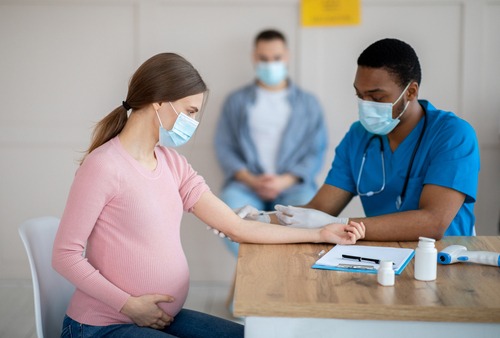
Groups of medical experts this week proposed a standardized definition for defining and evaluating placental SARS-CoV-2 infections to optimize both clinical care and new research, as well as the pursuit of COVID-19 vaccinations for pregnant individuals.
The first came from a panel of experts convened by the National Institutes of Health (NIH), which analyzed gaps in the variety of methods currently used to diagnose cases of SARS-CoV-2 infection in the placenta. By moving to streamline and codify methodology, they believe that the comparison and interpretation of study results will proceed more smoothly.
That panel concluded that depending on the technique used — with detection of replication, viral transcripts, or proteins in placental tissue preferred — results should be classified as definitive, probable, possible, or unlikely. They urged the most scientifically rigorous techniques available to be utilized and that future papers on the topic address location and number of placental tissue samples collected, the method of preserving tissue, and detection techniques. Further, they recommended specific means for handling, processing, and examining placental tissue.
SARS-CoV-2, which causes COVID-19, has been linked to issues that can emerge in the placenta, including preterm births. However, due to the variety of methods used for diagnosis, determining the risks of placental infection has been difficult.
A joint declaration from nearly two dozen American maternal care and public health associations and organizations, from the American College of Obstetricians and Gynecologists to the Vaccinate Your Family organization, released this week called for all pregnant individuals to be vaccinated against COVID-19.
“Pregnant individuals are at increased risk of severe COVID-19 infection, including death,” the organizations said in a statement. “With cases rising as a result of the Delta variant, the best way for pregnant individuals to protect themselves against the potential harm from COVID-19 infection is to be vaccinated. Maternal care experts want the best outcomes for their patients, and that means both a healthy parent and a healthy baby. Data from tens of thousands of reporting individuals have shown that the COVID-19 vaccine is both safe and effective when administered during pregnancy. The same data have been equally reassuring when it comes to infants born to vaccinated individuals. Moreover, COVID-19 vaccines have no impact on fertility.”
While the declaration from these health professionals was published widely, the recommendations from the NIH panel were published in the American Journal of Obstetrics and Gynecology. The latter was convened by NIH’s Eunice Kennedy Shriver National Institute of Child Health and Human Development (NICHD) and based on the opinions of gathered experts in obstetrics, virology, placental pathology, infectious disease, immunology, and molecular biology.




